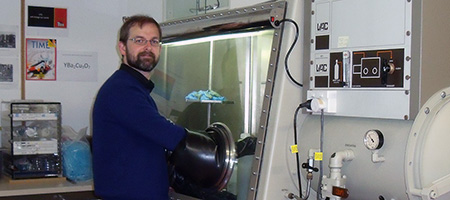
Dr Stuart Wimbush
Associate Investigator
- Phone:
- +64 4 463 0093
Address:
Robinson Research Institute
Victoria University of Wellington
PO Box 600
Wellington 6140
Biography
Stuart Wimbush is Principal Scientist in the Robinson Research Institute of Victoria University of Wellington, where he works at the intersection between applied science and early-stage engineering, envisioning, developing and prototyping future applications of high-temperature superconducting materials.
Stuart’s educational background is in Applied Physics (MPhys, University of Salford, UK), Physics (Dr. rer. nat., TU Dresden and Leibniz Institute for Solid State and Materials Research, Germany) and Materials Science (Postdoctoral Fellow, National Institute for Materials Science, Japan). He brings together the diverse strands of his academic training to address problems spanning the field of superconductivity from fundamental science to materials development to device application.
His vision is to help bring superconducting technologies out of the research laboratory and into widespread everyday use for the broad benefit of society at large. Some of the projects he is currently working on include the development of superconducting transformers for use on high-speed (bullet) trains, the application of superconducting motors to future electric passenger aircraft, and the design of superconducting magnets to enable high-efficiency space propulsion systems.
At the same time, he works on improving and better understanding the performance of the superconducting materials that underpin these technologies, with a view to further increasing the efficiency and thereby the economic attractiveness of these applications.
Research interests
Stuart's long-running research interest lies in the interplay of superconductivity and magnetism, two cornerstones of solid state physics.
Along the way, he has been diverted into the materials science aspects of the synthesis of wide-ranging novel materials, in particular via thin film routes and biochemical bulk synthesis. This in turn has led him to broader fields of investigation, encompassing other types of functional materials and nano-scale device fabrication.
The recently emerged field of sustainable energy devices is one of rapidly growing importance that offers the opportunity to combine these diverse interests towards a common goal.
Some of the world’s greatest modern challenges, from climate change to energy security to the future of humanity have the potential to be addressed in our lifetime through the application of superconducting technologies.
Dr Stuart Wimbush

In the news

Annual Report
Funding successes - Annual Report 2020
March 24, 2021
Funding successes for our investigators and their research programmes during 2020. This funding enables our researchers and collaborators to continue their breakthrough research in advanced materials and nanotechnology.

Annual Report
Awards - Annual Report 2019
May 26, 2020
This article from our 2019 Annual Report provides information about the range of awards received by MacDiarmid Institute Investigators over the past year.

Annual Report
2018 funding successes - Annual Report 2018
April 8, 2019
Funding successes for our investigators and their research programmes during 2018. This funding enables our researchers and collaborators to continue their breakthrough research in advanced materials and nanotechnology.

Interface Magazine
Stuart Wimbush: From materials to systems
July 13, 2015
Commercialising high temperature superconductors is what the 25 scientists and engineers at the Robinson Research Institute (RRI) do best. Formerly part of IRL, and called the Superconductivity and Energy Team, the RRI is now part of Victoria University of Wellington.


